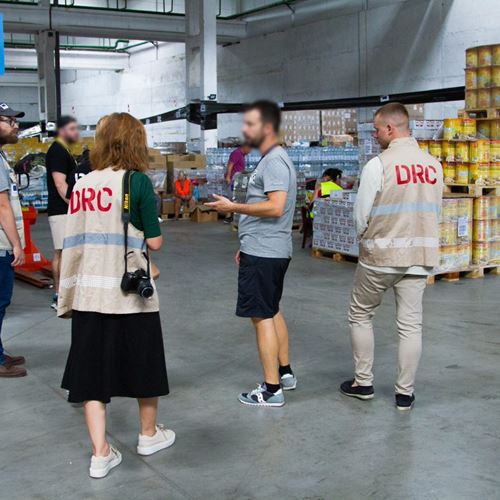Lend a hand to save Ukrainian lives – says the slogan of Palianytsia Fund, named after a traditional type of bread in Ukraine - a private fund set up as an initiative run by a group of businesspeople in Ukraine. Denys Drach is one of them, usually engaged in managing the dealership of one of the world’s big car brands in Ukraine. Now, his is one of the entrepreneurs behind this private charity initiative that has created a local humanitarian hub with the aim to organise and distribute in-kind donations. They manage to receive and ship off nearly anything from food, toys and clothes to ambulances and emergency aid kits.
The initiative is run from a warehouse offered by one of the parties involved, located in the outskirts of Lviv. This is a relatively safe part of Ukraine, in the west a couple of hours drive from the border to Poland, and earlier on also a preferred spot for Polish and local tourism. But now people arrive here with a few or no belongings, fleeing shelling, homes in ruins, and traumatised by experiences.
Lviv is now among the cities in Ukraine that has evolved into key locations hosting millions of internally displaced men, women and children who are seeking shelter and protection in past months. Others need support and help as they pass through Lviv on their way to Poland, Romania and Moldova or further afar in Europe along the routes of millions of displaced since 24 February 2022.
‘We are running this initiative based on goodwill from businesspeople in Ukraine and abroad, as well through contributions from organisations like DRC Danish Refugee Council. That's how we managed to quickly set up this facility to receive, package and send off thousands of boxes with basic supplies. We felt that we had to come together and do what we could in this current crisis in our country,’ tells Denys Drach from Palianytsia.
He explains how they ensure guidance from medical expertise to advise on first aid boxes allowing for people to treat infections, minor injuries, and other types of situations that can be handled without hospitalisation.
Marianne is one of them, a Ukrainian doctor usually working as a dental surgeon and who has traveled extensively across the country, including to eastern Ukraine. She is now among the key forces behind the private charity initiative, and tells how martial law, emergency needs and treatment for her goes way beyond issues such as Covid-19 that used to top the agenda.
‘For me, Covid somehow ended on 24 February when the offensive was launched,’ says Marianne. ‘Some problems are simply superseded by others. There is war in our country, and no time or room right now to focus on other than getting help to where it is needed to save lives.’
‘We want to direct resources to where they are most needed. That is why only those who pack and organise goods are hired and paid salaries in Palianytsia,’ explains Denys Drach. ‘The rest of us behind this initiative contribute our own money and time and we see this as key to our mission and how we operate. We want to be efficient and deliver goods as fast as possible, which is why the processes are based on principles used in our own lines of work and respective businesses,’ explains Denys Drach.
A long assembly line is set up in one end of the warehouse where the aid kits are being put together. It’s built on wooden pallets, next to them are hundreds of boxes, just folded and ready to be filled with goods from the meter high and densely packed shelves organised in themes and relevance to the different types of aid boxes and shipments. Once ready, these are sent to remote areas of east Ukraine and around the country where emergency aid and supplies are desperately needed.
‘With the contributions from DRC, we have been able to deliver 200 kits to people currently hosted in one of our large shelters here in Lviv. We are now looking at organising new kits that will address some of the needs we will see when winter comes and freezing temperatures will become a new challenge,’ says Denys Drach.
The content of the boxes differs and are compiled based on assessments from humanitarian stakeholders as well as information Palianytsia receive from people and communities in need.
‘Our aim is to make use of all paths and infrastructure available, formal and informal, but to make sure that we try everything possible to reach people in need where they are. We also manage to get aid to people who have either decided to stay behind because they are not capable of fleeing, or to some who are waiting right now for evacuation,’ says Denys Drach.
More boxes wait to be filled. With blankets, cereal, canned meat, coffee, tea, cookies, and more of the items that keep coming in from Ukrainians and others wanting to help Palianytsia make a difference in Ukraine.
Displayed on the walls in the warehouse are hundreds of colourful drawings sent in gratitude to Denys Drach and his team at Palianytsia from children all over Ukraine.
